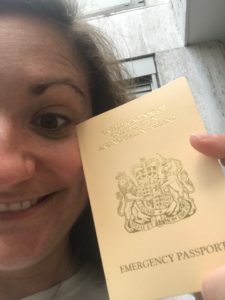I was in charge of the very important task of driving our English car back to where it belonged. I planned a relaxed trip home via the kinds of AirBnbs I love- all libraries and tea and cute churches in tiny villages. I hopped in the car and had a singalong all the way to the Black Forest. My AirBnB host asked for my passport details when I arrived. That’s when I realised that I- the smug multi-passport touting dual citizen- had forgotten all those passports. So how do you get home without a passport?
Option One: Blag It
I had digital copies of my British passport and my old Irish passport. I read about people turning up at ferry ports and airports with similar digital copies and pleading their case. But that, as the lady at UKBA happily told me, requires patience. You may have to wait around for hours while calls are made to verify your identity. I was a little concerned about using this strategy at Calais of all places: they are probably a bit over-anxious there these days.
Option Two: Emergency Travel Documents
Most countries have a system of obtaining these through an embassy/consulate. For a British citizen, ff your passport is lost, stolen, or you don’t have it “for some other reason” (interestingly vague), you can contact the Foreign and Commonwealth Office. They may be able to issue you with this wonderful creature called an emergency passport. It’s yellow and beautiful and solves all your problems. You have to fill out a form online and pay £100. If your passport was stolen, you have to produce a police report. You will need evidence of citizenship (your passport number, digital copy of your passport, birth cert, etc) and then you have to visit an embassy or consulate in the country where your passport went AWOL. Bring along a passport photo and declare the exact route that you are travelling with evidence of such. The exact dates and the countries you are entering are written in the passport so don’t get this information wrong. 24 hours later (or within an hour if you’re as lucky as me!), your passport will be ready.
The issue with this option is that an emergency passport does not waiver your need to have an appropriate visa for where you are visiting. You may need to contact the consulate of the country that you need a visa for and complete their processes, to either obtain a new visa or for them to update their records with your new emergency passport. How long that takes I cannot say…
Option 3: When Your Consulate is Not Available
Countries in the EU have an agreement that you can use the services of another EU country’s embassy/consulate if there isn’t one of yours in town. Otherwise, you should find your closest consulate in a neighbouring country and ask them whether there is any agreement that would allow you to use the services of another country’s consulate where you are. There will sometimes be organisations that are embassies or consulates in all but name. If you’re really worried, you can always ask before you leave which country manages your home country’s diplomatic relations in your destination country.

Key advice
- Always carry a few passport appropriate photos
- Keep digital copies of your passports accessible in some way while travelling, e.g. in a cloud service
- Call your embassy or another friendly embassy as soon as you can- they are there to help
- Remember to bring a passport with you when travelling…